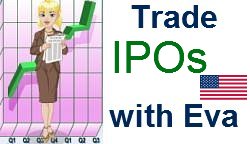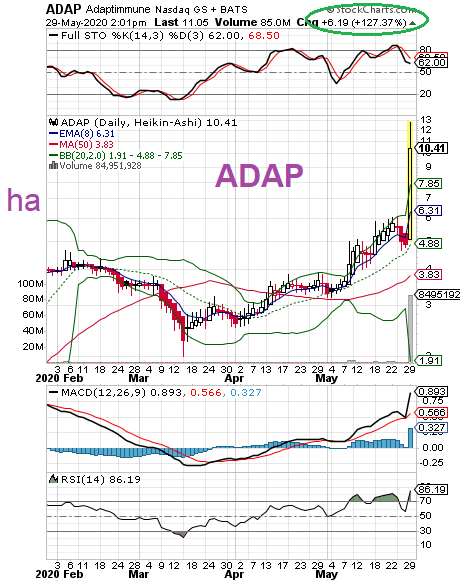JDE Peet's raised €2.25 billion ($2.5 billion) in an Amsterdam listing that valued the firm at €15.6 billion ($17.3 billion).
- chart (yahoo)
- Shares of JDE Peet’s surged 14% in their debut on Friday in Europe. The company, resulting from the merger of Jacobs Douwe Egberts and Peet’s last December, is the world’s No. 2 coffee player, with a portfolio that includes Jacobs Coffee, Douwe Egberts, Peet’s, L’OR, Senseo, Tassimo, Pickwick and more.
- The family behind JAB, the Reimanns, is facing scrutiny for its Nazi past, after the German newspaper Bild reported that Albert Reimann Sr. and his son Albert Reimann Jr., both of whom are now deceased, had ties to the Third Reich.
- The JDE Peet's IPO is the second-largest of the year world-wide. Beijing-Shanghai High-Speed Railway Corp. raised $4.4 billion on the Shanghai Stock Exchange in January, Dealogic data shows.
Fabien Simon of the coffee company JDE Peet's beats the gong of Euronext in Amsterdam on May 29, 2020, as the parent company of Douwe Egberts, among others, goes public on the Amsterdam stock exchange. (Photo by Jeroen JUMELET / ANP / AFP)
The Amsterdam-based business sold 14.4% of the company, including to funds controlled by billionaire investor George Soros. It issued new shares worth €700 million ($772.7 million), with existing shareholders, Mondelez International (MDLZ) and Acorn Holdings, selling an additional €1.55 billion ($1.7 billion).
Acorn Holdings is controlled by German investor JAB, the investment firm behind Panera, Pret A Manger, Krispy Kreme and Keurig Dr Pepper (KDP). Acorn is expected to own 62% of JDE Peet's following the listing, with Mondelez retaining 23%, according to a statement.
But most consumers still know very little about JAB Holding, the investment firm that pulled off the Peet’s IPO, or the family behind it: the Reimanns of Germany. Many coffee lovers are likely not even aware that one company is the owner or majority owner of Peet’s, Panera, Krispy Kreme, Dr. Pepper Snapple, Keurig Green Mountain, Caribou Coffee, Mighty Leaf, Stumptown, Intelligentsia, Espresso House, Baresso, Au Bon Pain, Bruegger’s Bagels, and Einstein Bros. Bagels.
JAB has spent more than $50 billion since 2014 to gobble up coffee, breakfast, and cosmetics names, and has quietly made itself the largest competitor to Starbucks.
JAB is family owned, privately held, and has roots dating back more than 100 years. The four primary owners of JAB are descendants of German chemist Ludwig Reimann, who in the 1800s married the daughter of his business partner,
Johann Adam Benckiser.
JAB, formed in 2011, gets its name from Benckiser’s initials.
The family is extremely private and does not do press, though one year ago the company did have to publicly comment on a Bild report about the Reimann family’s ties to the Third Reich. The family acknowledged the facts of the Bild report, and a spokesperson said last year: “It’s all correct. The family was absolutely ashamed.” After the report, the Reimann family said it would donate 10 million euros to a charity and hire a historian to investigate their ancestry in detail for a public report.
JAB will remain the majority shareholder in now-public
JDE Peet’s, and is the majority shareholder in publicly traded
Keurig Dr Pepper.
In many ways,
JAB bears similarities to
Anheuser-Busch InBev: a massive conglomerate formed through a long series of voracious M&A.
In 2004, Belgian brewer Interbrew (a combination of Belgian and Canadian brewers, formed in 1988) merged with Brazilian brewer AmBev (a combination of Brazilian and Argentinian brewers, formed in 1999) to form InBev. In 2008, Belgian brewer InBev bought St. Louis-based Anheuser-Busch to form Anheuser-Busch InBev. In 2012, AB InBev acquired Grupo Modelo, and in 2016, AB InBev bought SABMiller.
JAB—in a much shorter time—has gone on a similar spending run. JAB has bought or combined around 15 coffee and tea brands between 2012 and 2019, including Douwe Egberts, for which it paid $10 billion. It bought Peet’s in 2012 for $975 million (and got upmarket American roasters Stumptown and Intelligentsia along with it), Einstein in 2014 for $375 million, Keurig Green Mountain for $14 billion and Krispy Kreme for $1.35 billion in 2016, Panera for $7.5 billion in 2017, and bought Dr. Pepper Snapple through Keurig Green Mountain in 2018.
And JAB isn’t done: now it’s pushing into pet care (but not pet food), beginning with buying Compassion First Pet Hospitals for $1.2 billion last year.
***
The family behind JAB, the Reimanns, is facing scrutiny for its Nazi past, after the German newspaper Bild reported that Albert Reimann Sr. and his son Albert Reimann Jr., both of whom are now deceased, had ties to the Third Reich.
According to Bild, both men were fierce Hitler supporters and anti-Semites, donated to the SS military force, and used forced labor of French prisoners in their factories.
In other words, the Reimann family fortune is rooted in the Nazi party. And that could put the brands in the JAB portfolio under the microscope like never before.




























